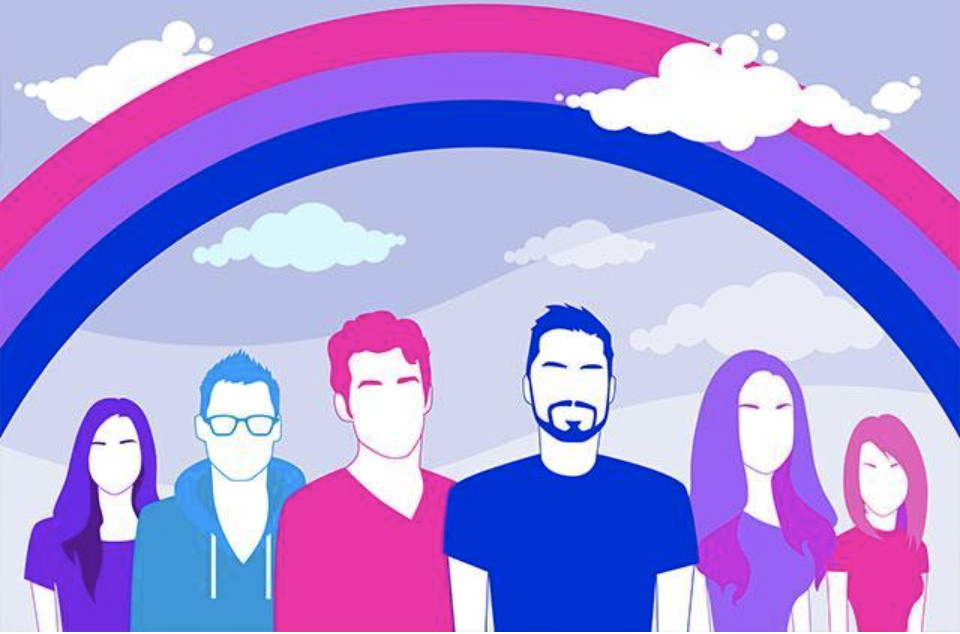[et_pb_section admin_label=”section”]
[et_pb_row admin_label=”row”]
[et_pb_column type=”4_4″]
[et_pb_text admin_label=”Text”]
TABITHA THEARD WRITES – Bi-Visibility Day began in 1996, when American LGBTQI (Lesbian, Gay, Bisexual, Transgender, Queer and Intersex) Rights activists Wendy Curry, Michael Page and Gigi Raven Wilbur noticed a lack of representation for bisexuals in queer movements. Thus, they organized to raise awareness of their sexuality and dispel stigmas surrounding it, ultimately creating an annual Bi-Visibility Day (September 23rd). Fast-forward 19 years and the holiday is now celebrated worldwide by a variety of countries.
Here is how people from different Asian countries have been celebrating Bi-Visibility Month:
China/Hong Kong
In China, activists are renewing a push for same-sex marriage. After moving to phase II of drafting a new Civil Code, Sun Wenlin, pictured above with his partner, posted on his WeChat account instructions for how to submit revisions to the Civil Code in order to protect same-sex marriages; it went viral on Weibo, increasing his followers (who began to rally after his own marriage application was rejected) from 5,000 to over 20,000.
Meanwhile, the Hong Kong LGBTQI community is hosting its 29th film festival from September 8th to the 26th, opening with the Cannes Film Festival Selections Sorry Angel and the Toronto Film Festival Selection My Days of Mercy. This Hong Kong Lesbian and Gay Film Festival is an international annual event designed to: 1) support LGBTQI members of the film industry, as well as 2) provide greater representation for LGBT members in diverse Asian films. This year will be its largest yet, showcasing 29 features and 30 short films. The festival’s ultimate goal: to be “the center of the Asian LGBTQI film festival circuit,” screening more Asian LGBTQI films than any other festival in the region.
Rina Sawayama – Japanese/British Popstar
Rina Sawayama– a pansexual Popstar of Japanese descent living in London– took to Twitter on September 1st to demonstrate her solidarity with the Bi-community by owning up to internalized biphobia so as to reshift the Bisexual narrative. Less than a week later, Sawayama released a music video for her single “Cherry”–the first song in which she admits to having feelings for women and talks about becoming comfortable in her sexual identity.
Sawayama made it clear in interviews that her song not only tells her personal coming out story but pushes back against the heteronormative nature of music. She claims she wasn’t comfortable with her sexual identity while growing up because “there was no one on TV or anywhere that [she] could point to.”
India
Last but definitely not least, India, just a few weeks ago made its biggest stride towards equal rights for LGBTQI peoples by legalizing gay sex. Overturning a 2013 ruling based on a colonial-era law (section 377), chief justice Dipak Misra stated that the law had become a weapon of harassment and that “any discrimination on the basis of sexuality amounts to a violation of fundamental rights”. Yet while many celebrated, Indian LGBTQI activists are now saying this is just the beginning of a long journey towards gender rights. Many politicians, including Indian Prime Minister Narendra Modi , failed to acknowledge the ruling the day it occurred.
These may be just a few steps forward for a few countries, but a giant leap forward for mankind. Make that humankind.
[/et_pb_text]
[/et_pb_column]
[/et_pb_row]
[/et_pb_section]





